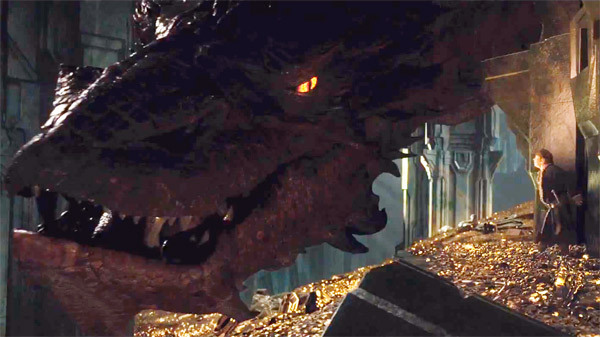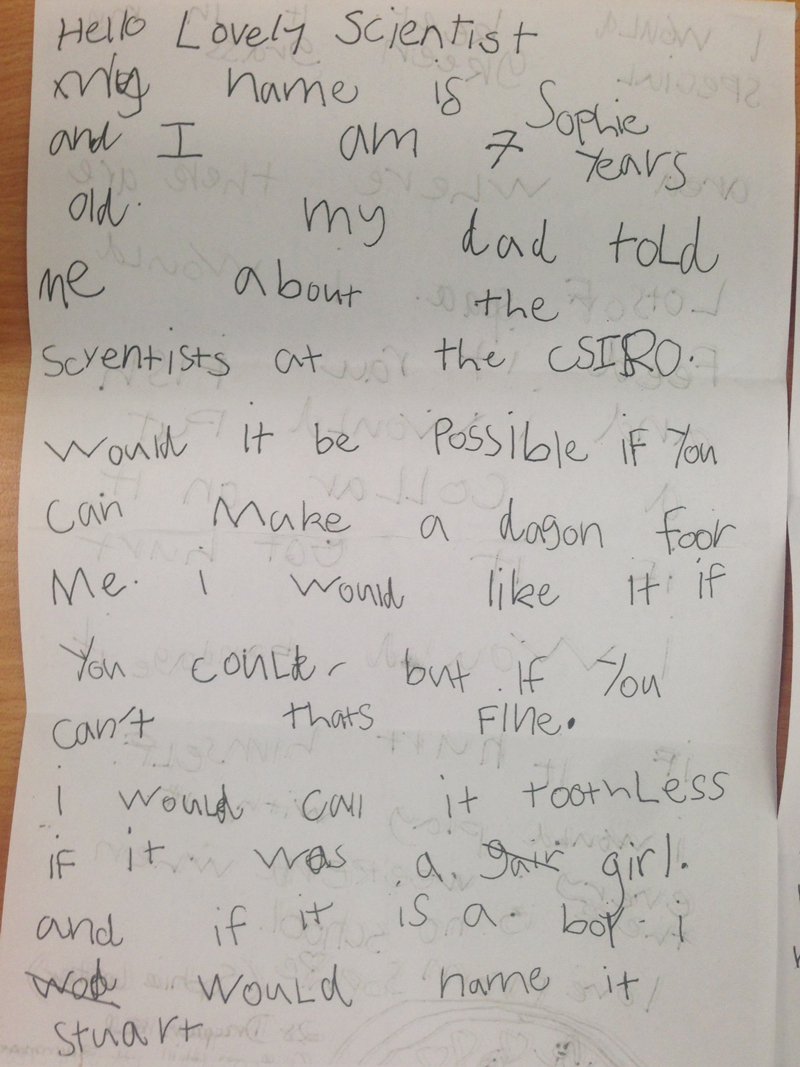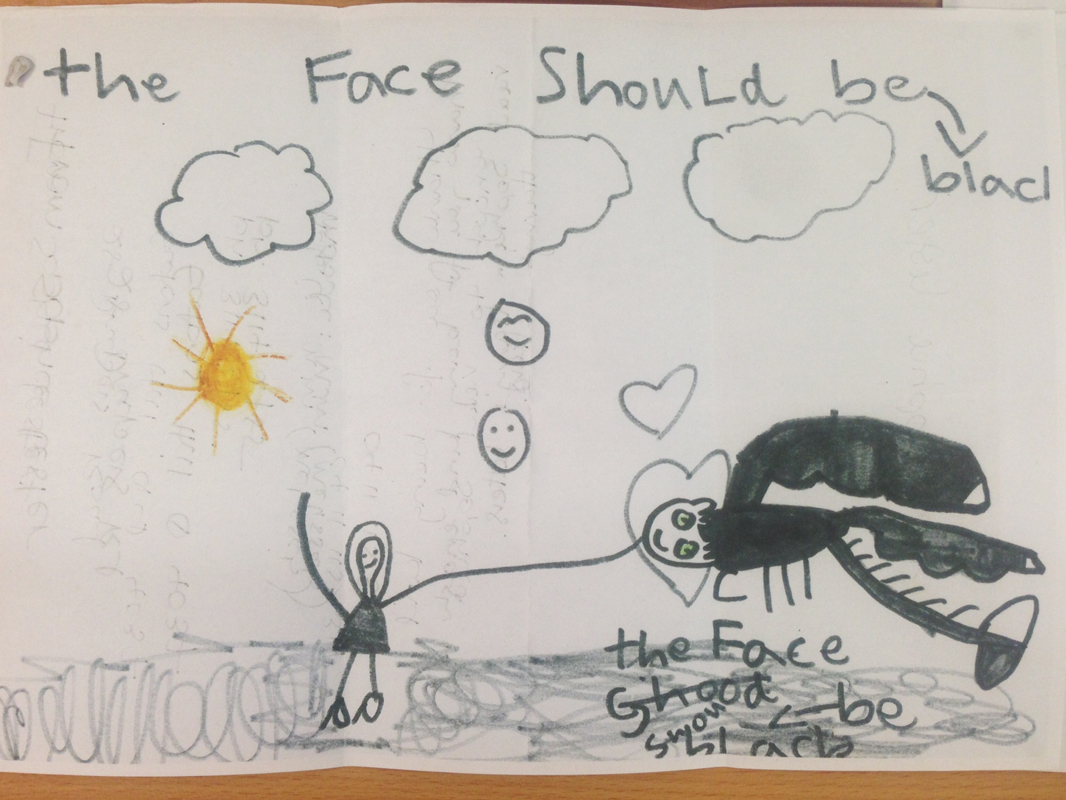When 7-year-old Sophie wrote to Australia's leading science agency and asked for a dragon, we knew it was time to step up our dragon R&D program.

A mythical generator: Could the fire in Smaug’s belly power a small city?
We’ve been doing science since 1926 and we’re quite proud of what we have achieved. We’ve put polymer banknotes in your wallet, insect repellent on your limbs and Wi-Fi in your devices. But we’ve missed something.
There are no dragons.
Over the past 87 odd years we have not been able to create a dragon or dragon eggs. We have sighted an eastern bearded dragon at one of our telescopes, observed dragonflies and even measured body temperatures of the mallee dragon. But our work has never ventured into dragons of the mythical, fire breathing variety.
And for this Australia, we are sorry.
This came to our attention today when we received the following letter:
Hello Lovely Scientist
My name is Sophie and I am 7 years old. My dad told me about the scientists at the CSIRO. Would it be possible if you can make a dragon for me. I would like it if you could but if you can’t thats fine.
I would call it toothless if it was a girl and if it is a boy I would name it Stuart.
I would keep it in my special green grass area where there are lots of space. I would feed it raw fish and I would put a collar on it. If it got hurt I would bandage it if it hurt himself. I would play with it every weekend when there is no school.
Love from Sophie

Fanmail, with a call for dragon R&D.
Last week the Scientific American hypothesised whether dragon fire would be produced by flint, gas, or rocket fuel. We already do some research in alternative fuels, so perhaps dragon fuel is a good area for us to start accelerating our dragon R&D program. Hobbit fans would have observed the amount of fire in Smaug’s belly. But how much energy could it produce? Would dragon fuel be a low emissions option?
Thanks for the fuel for thought, Sophie. We’re looking into it. In the meantime, you can always admire the brood of Daenerys Targaryen.
Sophie’s dragon.
* * *
UPDATE: We made Sophie a dragon. Really. Check it out in our latest post, Here be 3D printed dragons.



8th January 2014 at 3:22 pm
I think the classic text here is Dickinson’s ‘The Flight of Dragons’: http://books.google.com.au/books?id=XzOfAAAACAAJ
He has them as hydrogen-filled, for buoyancy and combustion.
11th January 2014 at 6:22 am
+1 Michael, you beat me to it! This book IS the definitive “thesis” on dragons. I had the pleasure of reading it in my early 20’s, and still remember it.
Wikipedia describes it as “a speculative natural history book”. It includes gorgeous illustrations by Wayne Anderson and would be very easy for Sophie to read.
Dickinson includes such explanations as (e.g.) the dragon’s hoard of gold was just because its corrosive body would erode all other minerals in its cave, leaving only gold behind.
8th January 2014 at 3:11 pm
Well done CSIRO. More priceless work from the worlds best. Shows you can be among the worlds smartest yet still grounded. Makes me proud to be Australian.
8th January 2014 at 3:03 pm
Hmmm, maybe the DNA option has some credence. By all accounts there are pigs that can fly which must mean that this has been done before……………..
As an aside, there is a movie called IVOR THE ENGINE that may provide some inspiration to the scientists at CSIRO. Clearly the dragons exist – they just don’t want to be found.
8th January 2014 at 2:30 pm
I’m a scientist and a circus performer, I would be happy to don wings and breath fire for the young lady by way of apology for our lack of scientific progress in this regard. (if she is local to Canberra, or wants to visit)
8th January 2014 at 2:08 pm
Remember Dolly the sheep? Perhaps mixing the DNA of a lizard and a bat, as suggested by Andrezza Agapito’s son..? We could then have dragons as similar as the ones in the Game of Thrones 🙂
10th January 2014 at 5:03 pm
Or perhaps dragonettes?
18th January 2014 at 7:42 am
Sorry to be a killjoy, but Dolly was a clone, not a transgenic animal, so her genes were all naturally found in sheep. However we have made animals such as GloFish which have fluorescent jellyfish genes in them, so it may be possible to have a bat-lizard.